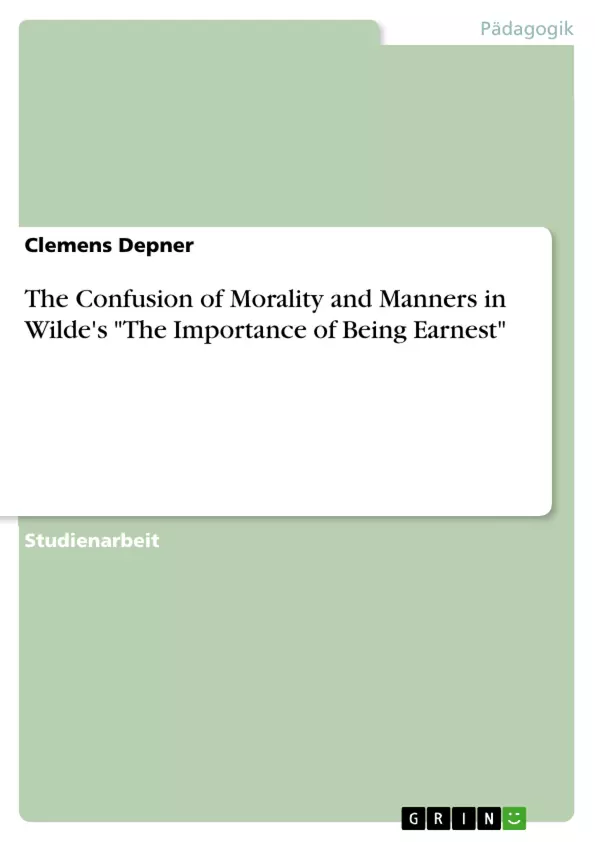This paper examines Oscar Wilde's drama "The Importance of Being Earnest" regarding his representation of morality and manners in the context of Victorian society in the late nineteen hundreds. It turns out that his drama has at least a twofold "message".
On the one hand he portrays his own aesthetic convictions which stood contrary to Victorian society, on the other hand Wilde criticizes Victorian customs and manners and reveals the hypocrisy of the upper class in his days. This paper not only summarizes Wilde's aesthetic philosophy and convictions but also shows how they are presented in his drama.
Inhaltsverzeichnis
- I. Einleitung
- II. Wildes Sicht auf Moral und Manieren im Kontext seiner ästhetischen Überzeugungen
- III. Anwendung von Wildes ästhetischer Sicht auf Moral und Manieren in The Importance of Being Earnest
- IV. Schlussfolgerung
- V. Zitierte Werke
Zielsetzung und Themenschwerpunkte
Die vorliegende Arbeit untersucht die Darstellung von Moral und Manieren in Oscar Wildes Stück The Importance of Being Earnest und analysiert, wie diese Darstellung Wildes ästhetische Ideen unterstützt und gleichzeitig viktorianische Vorstellungen von Moral und Manieren in Frage stellt. Der Schwerpunkt liegt auf der Erforschung von Wildes ästhetischen Prinzipien und ihrer Anwendung auf die Figuren und die Handlung des Stückes.
- Die ästhetischen Überzeugungen Oscar Wildes
- Die Darstellung von Moral und Manieren in The Importance of Being Earnest
- Die Kritik an viktorianischen Normen und Moralvorstellungen
- Die Bedeutung von Künstlichkeit und der Suche nach Schönheit
- Die Verwirrung von Moral und Manieren in der viktorianischen Gesellschaft
Zusammenfassung der Kapitel
I. Einleitung
Die Einleitung bietet eine Einführung in das Stück The Importance of Being Earnest und stellt die These auf, dass Wilde die viktorianischen Moralvorstellungen durch die Verwendung seiner ästhetischen Ideen untergräbt.
II. Wildes Sicht auf Moral und Manieren im Kontext seiner ästhetischen Überzeugungen
Dieses Kapitel untersucht Wildes ästhetische Überzeugungen und beleuchtet, wie sie sich auf seine Sicht von Moral und Manieren auswirken. Es wird die Bedeutung von Kunst für Kunst und die Autonomie des Künstlers in Bezug auf moralische und gesellschaftliche Normen diskutiert.
III. Anwendung von Wildes ästhetischer Sicht auf Moral und Manieren in The Importance of Being Earnest
Dieses Kapitel untersucht die Anwendung von Wildes ästhetischen Ideen auf die Figuren und die Handlung des Stücks. Es werden Beispiele für die Künstlichkeit und die Verwirrung von Moral und Manieren in der viktorianischen Gesellschaft aufgezeigt.
Schlüsselwörter
Die wichtigsten Schlüsselwörter und Themen des Textes sind: Oscar Wilde, The Importance of Being Earnest, Ästhetizismus, Moral, Manieren, viktorianische Gesellschaft, Kunst für Kunst, Künstlichkeit, Doppelmoral, Hypocrisy.
Häufig gestellte Fragen
Welches Werk von Oscar Wilde wird in dieser Arbeit untersucht?
Die Arbeit untersucht das Drama „The Importance of Being Earnest“ (Ernst sein ist alles).
Wie stellt Wilde das Verhältnis von Moral und Manieren dar?
Wilde zeigt eine Verwechslung oder Gleichsetzung von Moral und Manieren in der viktorianischen Gesellschaft auf, wobei die äußere Form oft wichtiger ist als der moralische Gehalt.
Was ist die „doppelte Botschaft“ des Stücks?
Einerseits porträtiert Wilde seine eigenen ästhetischen Überzeugungen, andererseits kritisiert er die Heuchelei und die starren Sitten der viktorianischen Oberklasse.
Welche Rolle spielt der Ästhetizismus in der Analyse?
Die Arbeit erläutert Wildes ästhetische Philosophie, insbesondere das Prinzip „Kunst für die Kunst“, und wie dieses die Figuren und Handlung des Stücks beeinflusst.
Wie wird die viktorianische Gesellschaft kritisiert?
Wilde nutzt Komik und Künstlichkeit, um die Doppelmoral und die Oberflächlichkeit der gesellschaftlichen Normen seiner Zeit zu entlarven.
- Citar trabajo
- Clemens Depner (Autor), 2022, The Confusion of Morality and Manners in Wilde's "The Importance of Being Earnest", Múnich, GRIN Verlag, https://www.grin.com/document/1369151



